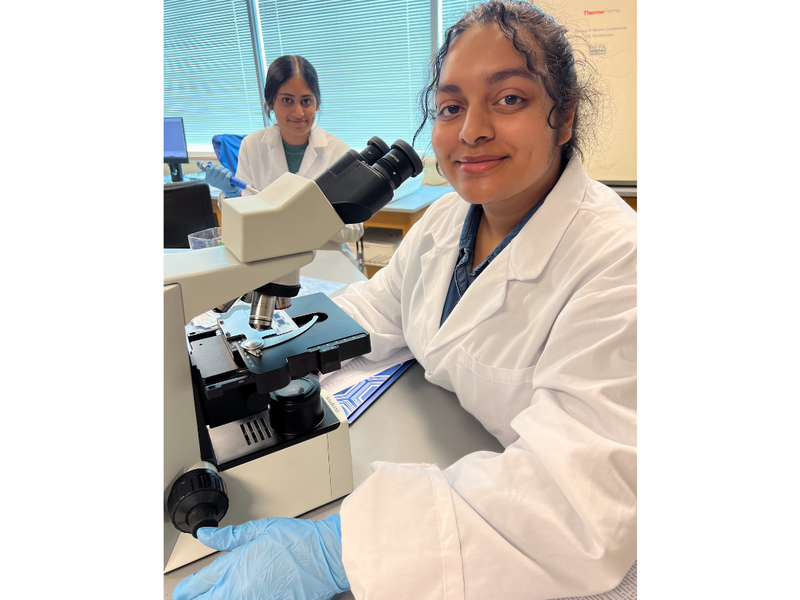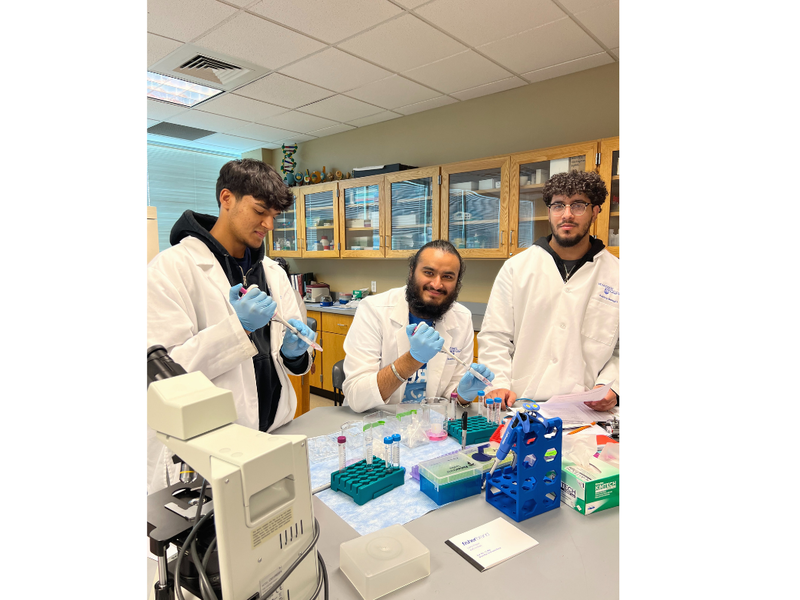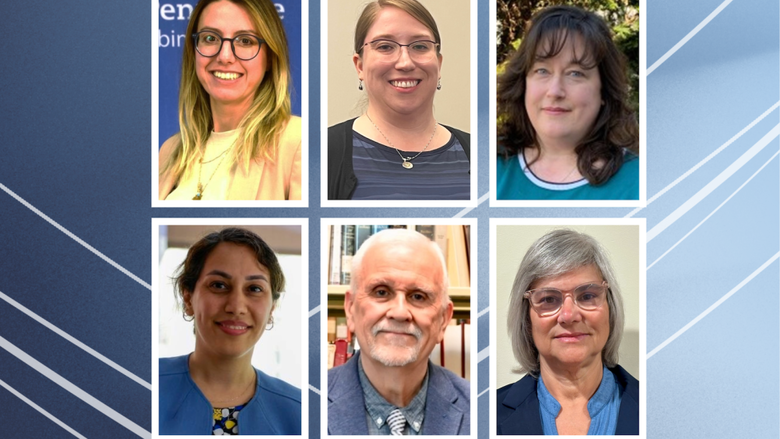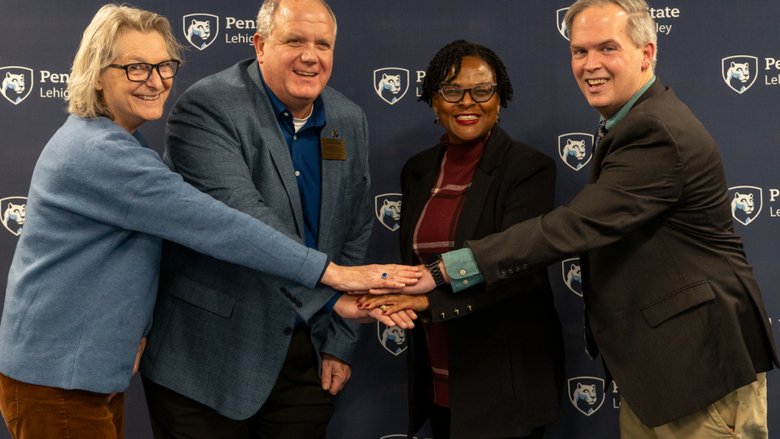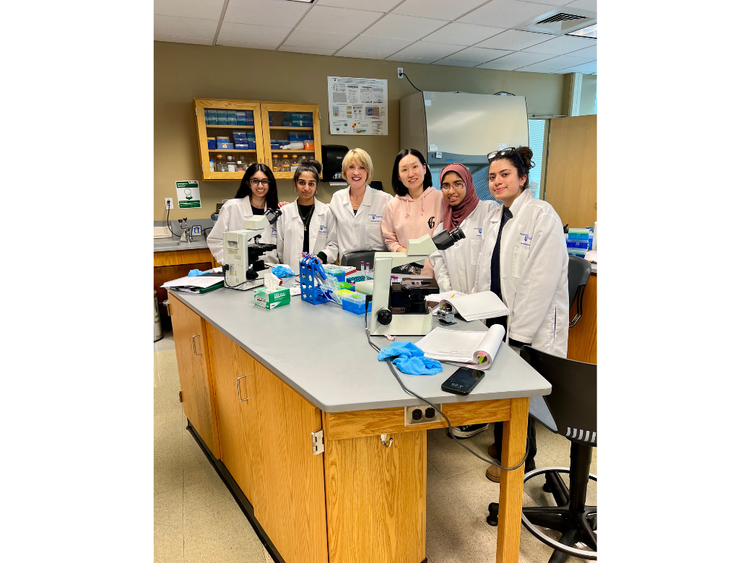
Students in Jacqueline McLaughlin’s "BIOL 230W: Cells and Molecules" course are participating in a new Course-Based Undergraduate Experience (CURE) which focuses on developing optimal cell culture conditions to study the glycocalyx of mammalian aortic endothelial cells using state-of-the-art methods.
CENTER VALLEY, Pa. — Penn State Lehigh Valley's new partnership with a leading international biotech company will help develop qualified researchers of tomorrow.
Jacqueline McLaughlin, Lehigh Valley professor of biology and founding director of the Penn State CHANCE program, and Yu Mi Jeong, lab technician, co-developed a new Course-Based Undergraduate Experience (CURE), which focuses on developing optimal cell culture conditions to study the glycocalyx of mammalian aortic endothelial cells using state-of-the-art methods. To do this, McLaughlin and Jeong have teamed up with biotech company AMSBIO.
As part of this partnership, AMSBIO has so far donated approximately $3,000 of molecular biology reagents plus technical expertise to assist with this undergraduate research endeavor. Penn State Lehigh Valley students taking the biology majors course, "BIOL 230W: Cells and Molecules," are already engaging in this CURE and have expressed excitement about its potential.
Working with AMSBIO aligns directly with McLaughlin’s commitment to undergraduate research and giving her students as many opportunities as possible to do real science, she said.
“It has always been my way to build partnerships with entities near and far, be it academic, governmental, non-governmental or corporate that can support and augment undergraduate research that is authentic and valuable to society,” McLaughlin said.
McLaughlin is also known for her work creating Course-based Undergraduate Research Experiences (CUREs).
“A CURE is an immersive lab activity that engages a whole class of students in addressing a research question or problem that is of interest to the scientific community and society in general," she said. "Yu Mi and I developed this new CURE to address the problem of endothelial dysfunction, a common and early event in cardiovascular disease (CVD) which happens when damage occurs to the thin layer of cells that lines our blood vessels. Understanding the vascular endothelium helps minimize the risk of developing CVD and its manifestations, such as heart attack, atherosclerosis, impaired vasodilation, inflammation and stroke.”
After developing their CURE, next came the most critical components — funding to support the cell and molecular reagents needed and state-of-the art immunofluorescent microscopic protocols to be followed.
“We made a wish-list of what was needed and determined how much this CURE, in particular, would cost," she said. "It was over $3,000 just for reagents. I couldn’t think of a better partner than AIMSBIO — the biotech company who develops and sells the highest quality antibodies and fluorescent probes for cell research. So, call I called them up!”
According to the company’s website, AMSBIO’s mission is to be a profitable premier provider of quality life science research reagents and services helping customers develop innovative methods, processes, products, and medicines. AMSBIO offers unique partnerships for the global market to small- and mid-sized manufacturers, academic groups, and revenue-generating biotech and by providing state-of-the-art and cost-effective solutions to end users and partners.
The Penn State Lehigh Valley and AMSBIO partnership now is underway.
“Students are now using a cutting-edge technique wherein they use a biotinylated antibody and a streptavidin fluorescent tag to localize components of the glycocalyx of cultured bovine aortic epithelial cells," Jeong said.
Excitedly, she said, this partnership is set to further than just providing reagents and procedural advise. Company representatives will be part of a panel discussion next semester focused on careers in biotech.
“The employees at AIMSBIO are phenomenal scientists. It’s important for our students to see what niches can be filled in the biotech field and how best to enter the job market. AMSBIO sees the need to help train future biotech employees,” McLaughlin said.
She called it a “win-win” partnership — AMSBIO provides the reagents students need to conduct research, and in turn, Penn State Lehigh Valley produces a pool of trained, skilled biotech researchers for AMSBIO and other employers.
Jeong has benefited from working on the CURE initiative professionally, as well.
“Through co-developing a new biotech-related CURE for cell biology at [Penn State Lehigh Valley], I’ve had opportunities to utilize new immunofluorescent methods, imaging software capabilities and quantitative analytical approaches in cell biology, resulting in more accurate experimental results and simplified experiment procedures for our students,” Jeong said. “Personally, these experiences have provided me with new insights and skills, allowing for my professional growth in the field of cell culture research.”
Both McLaughlin and Jeong are getting the ultimate benefit, however, they said.
"We get satisfaction watching students mature into competent scientific researchers,” McLaughlin said.
